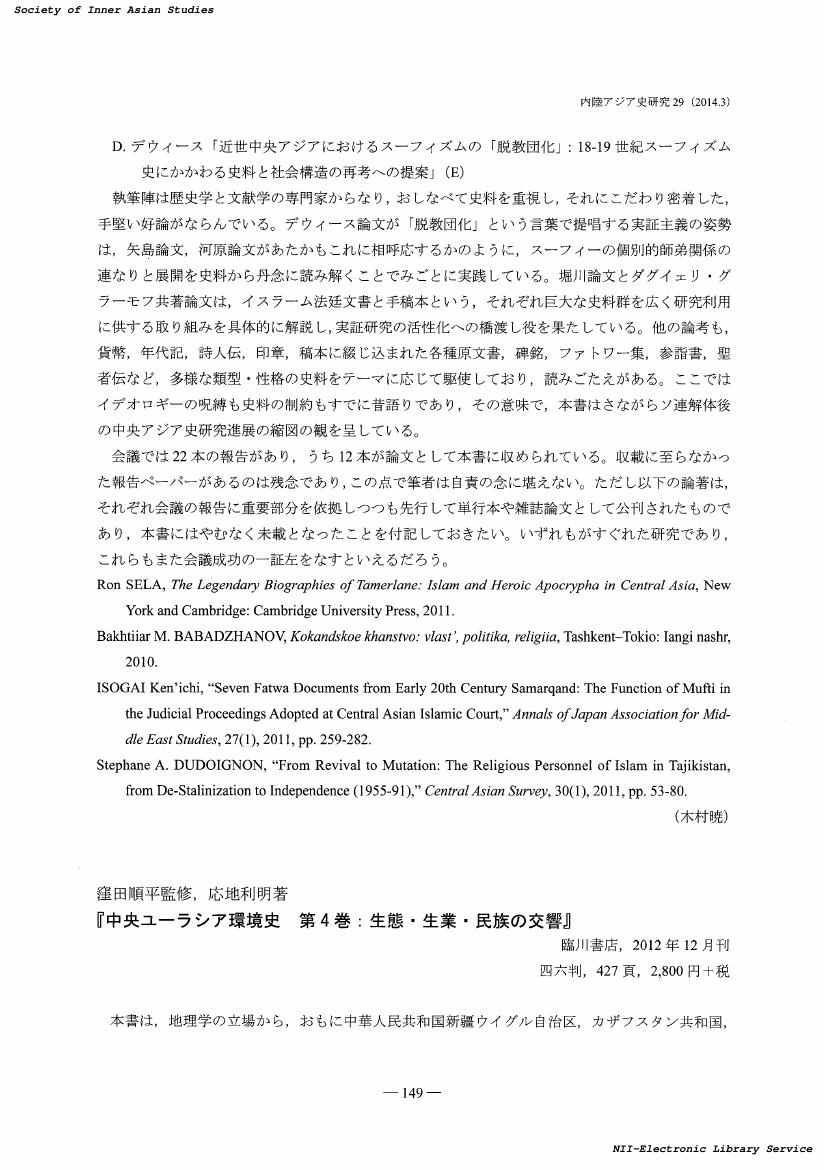- 著者
- 塩谷 哲史
- 出版者
- 内陸アジア史学会
- 雑誌
- 内陸アジア史研究 (ISSN:09118993)
- 巻号頁・発行日
- vol.31, pp.73-92, 2016-03-31 (Released:2017-05-26)
This article analyses the factors behind the failure of the Amu River diversion project initiated by the Grand Duke Nikolai Konstantinovich in the territories of the Khanate of Khiva at the end of the 1870s. Shioya (2014) argued the details of the Grand Duke's project and the response of the government of Khiva to them, but the response of the general-governorship of Turkestan, the then supreme military-administrative organ of the Russian Empire in Central Asia, to the project still needs to be analysed. From the correspondence between the governor-general K. P. von Kaufman and a zoologist, D. Alenitsyn, it is evident that the former's response concerned the militarily strategic importance of the navigation of the Amu River, and the contemporary situation in Afghanistan, that is, the ongoing Second Anglo-Afghan war. Within the war ministry, the logistics connecting the navigation of the major river with the planned railroad between Central Asia and Russia were highly evaluated. In addition, the influence of the Duke's activities on the Turkmens in Khiva was also considered to bring instability to the khanate, regarding which Alenitsyn pictured the worst-case scenario, namely, the collapse of Russian rule in Central Asia with the spread of native disturbances initiated by the British-Indian army, if the army were to march through the Amu River basin. These factors, in line with the Grand Duke's misapprehension of the history and irrigation of the lower basin of the Amu, led to the failure of his diversion project.
2 0 0 0 OA ウィリアム・ウッド著, 『ヒヴァ・ハン国のタルハン・ヤルリグ集成』
- 著者
- 塩谷 哲史
- 出版者
- 内陸アジア史学会
- 雑誌
- 内陸アジア史研究 (ISSN:09118993)
- 巻号頁・発行日
- vol.22, pp.121-128, 2007-03-31 (Released:2017-10-10)
2 0 0 0 西アジア地域の都市空間の重層性に関する計画論的研究
- 著者
- 塩谷 哲史
- 出版者
- 内陸アジア史学会
- 雑誌
- 内陸アジア史研究 (ISSN:09118993)
- 巻号頁・発行日
- vol.30, pp.93-94, 2015-03-31 (Released:2017-10-10)
1 0 0 0 OA ハン,企業家,帝国 : ラウザーン運河をめぐるロシア=ヒヴァ・ハン国関係の変遷 一八七三-一九一七年(公開講演・研究発表要旨,2013(平成25)年度内陸アジア史学会大会記事,彙報)
- 著者
- 塩谷 哲史
- 出版者
- 内陸アジア史学会
- 雑誌
- 内陸アジア史研究 (ISSN:09118993)
- 巻号頁・発行日
- vol.29, pp.183-184, 2014-03-31 (Released:2017-10-10)
- 著者
- 塩谷 哲史
- 出版者
- 内陸アジア史学会
- 雑誌
- 内陸アジア史研究 (ISSN:09118993)
- 巻号頁・発行日
- vol.29, pp.149-150, 2014-03-31 (Released:2017-10-10)
- 著者
- 塩谷 哲史
- 出版者
- 内陸アジア史学会
- 雑誌
- 内陸アジア史研究 (ISSN:09118993)
- 巻号頁・発行日
- vol.29, pp.157-158, 2014-03-31 (Released:2017-10-10)
- 著者
- 塩谷 哲史
- 出版者
- メトロポリタン史学会
- 雑誌
- メトロポリタン史学 (ISSN:18807542)
- 巻号頁・発行日
- vol.8, pp.107-129, 2012-12-20
- 著者
- 塩谷 哲史
- 出版者
- 公益財団法人 史学会
- 雑誌
- 史学雑誌 (ISSN:00182478)
- 巻号頁・発行日
- vol.112, no.6, pp.1116-1117, 2003-06-20 (Released:2017-12-01)
- 著者
- 塩谷 哲史
- 出版者
- 内陸アジア史学会
- 雑誌
- 内陸アジア史研究 (ISSN:09118993)
- 巻号頁・発行日
- vol.31, pp.73-92, 2016
<p>This article analyses the factors behind the failure of the Amu River diversion project initiated by the Grand Duke Nikolai Konstantinovich in the territories of the Khanate of Khiva at the end of the 1870s. Shioya (2014) argued the details of the Grand Duke's project and the response of the government of Khiva to them, but the response of the general-governorship of Turkestan, the then supreme military-administrative organ of the Russian Empire in Central Asia, to the project still needs to be analysed. From the correspondence between the governor-general K. P. von Kaufman and a zoologist, D. Alenitsyn, it is evident that the former's response concerned the militarily strategic importance of the navigation of the Amu River, and the contemporary situation in Afghanistan, that is, the ongoing Second Anglo-Afghan war. Within the war ministry, the logistics connecting the navigation of the major river with the planned railroad between Central Asia and Russia were highly evaluated. In addition, the influence of the Duke's activities on the Turkmens in Khiva was also considered to bring instability to the khanate, regarding which Alenitsyn pictured the worst-case scenario, namely, the collapse of Russian rule in Central Asia with the spread of native disturbances initiated by the British-Indian army, if the army were to march through the Amu River basin. These factors, in line with the Grand Duke's misapprehension of the history and irrigation of the lower basin of the Amu, led to the failure of his diversion project.</p>





